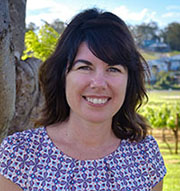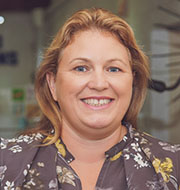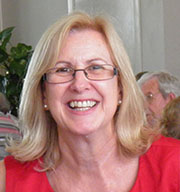* CSU research proposal seeks to enhance life quality for people living with dementia in the Mid North Coast
* Port Macquarie recognised by Dementia Australia NSW as a community taking positive steps to make it dementia-friendly
* An authentic partnership approach involves ‘working with’ people living with dementia as partners, rather than ‘caring for’ them
 A Charles Sturt University (CSU) research proposal aims to enhance the quality of life of people living with dementia in the Mid North Coast region by examining their experiences in creative and arts-based programs.
A Charles Sturt University (CSU) research proposal aims to enhance the quality of life of people living with dementia in the Mid North Coast region by examining their experiences in creative and arts-based programs.
The proposal was presented today at the 10th Annual International Arts and Health Conference in Port Macquarie by Associate Professor Rylee Dionigi (pictured left), a researcher and lecturer in the CSU School of Exercise Science, Sport and Health in Port Macquarie, and her colleagues, local artist and creative ageing practitioner Ms Lisa Hort (pictured below), and Ms Debbie Sommers (picture lowest, in red) from Port Macquarie Museum and Historical Society.
“The arts are a powerful way to transform the lives of individuals and reduce the stigma and social exclusion associated with people living with dementia,” Professor Dionigi said.
“Current local dementia-friendly arts and health programs, such as Creative Ageing Art, Hands-On-Heritage, and TimeSlips Heritage, have not been formally researched, despite Port Macquarie being recognised by Dementia Australia NSW as a community taking positive steps to make it dementia-friendly.
 “My co-researchers and I intend to conduct six in-depth qualitative case studies on such programs from the perspectives and experiences of people living with dementia, their families, carers, health care workers and community members through in-depth interviews, focus groups and observations.”
“My co-researchers and I intend to conduct six in-depth qualitative case studies on such programs from the perspectives and experiences of people living with dementia, their families, carers, health care workers and community members through in-depth interviews, focus groups and observations.”
Professor Dionigi explained that in some healthcare contexts, it is often assumed that the person in need of care is incapable of making decisions or meaningful contributions to their care, their lives or other people, which results in their exclusion from decision-making processes and reinforces the dominant top-down, biomedical model of care.
“Authentic partnerships is an alternative, relationship-centred model of care that involves individuals, their families, health care workers, researchers and the community in the decision-making processes and recognises the value of collaboration in improving the quality of life of everyone involved,” she said.
“Our project idea is framed in an authentic partnership approach because it involves ‘working with’ people living with dementia as partners in arts-based programs and research, rather than ‘caring for’ them. We value joint learning and sharing, include regular critical reflection and highlight the collective capacity for social change and personal empowerment in the ‘dementia care’ context.”

“Our findings will include the voices and contributions of people living with dementia, resulting in an evidence-based model, and guidelines for others delivering similar arts-based programs in Australia.
“Therefore, our research has the potential to translate into better clinical practice by collecting art-based stories of dementia-specific care in a variety of creative ways, identifying program strengths and best-practice examples of quality care experiences, and then using these as a foundation to facilitate change and improve care experiences for everyone involved.”
Their presentation challenged conference participants to ‘think outside the square’ and consider ways they might adopt an authentic partnership approach and be provocative through the use of the arts, creative ideas and radical thinking that could be applicable in their healthcare or work.





Social
Explore the world of social